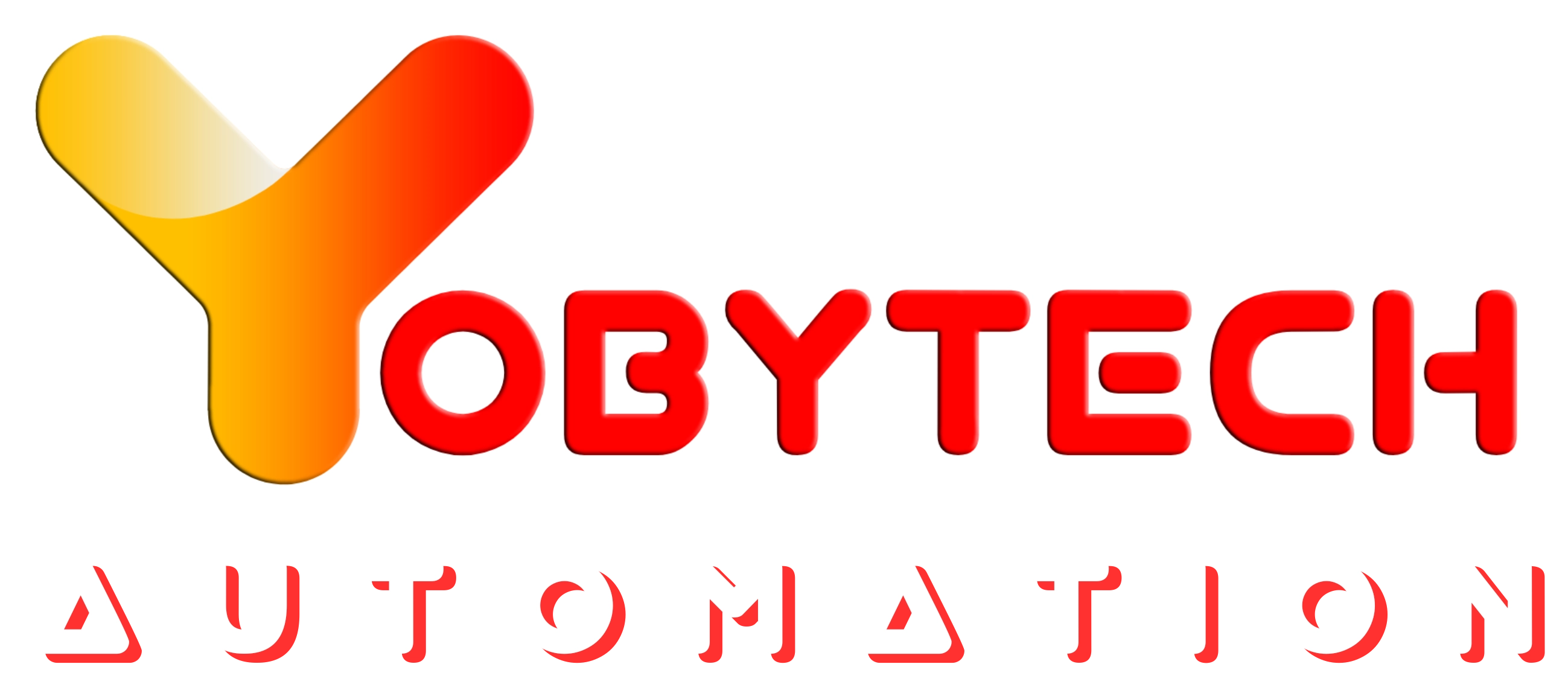What is Industry 4.0 and Why Does It Matter?
Welcome to the Fourth Industrial Revolution.
The global industrial landscape is undergoing a paradigm shift. Automation, data exchange, and intelligence are no longer optional — they are foundational. Industry 4.0, or the Fourth Industrial Revolution, represents the digital transformation of manufacturing, utilities, agriculture, and infrastructure through technologies like IoT, AI, cloud computing, ERP, and real-time analytics.
In the center of this transformation is YoByTech Automation, building intelligent, scalable, and future-ready solutions that enable industries to unlock the full potential of Industry 4.0 — both in India and globally.
What is Industry 4.0?
Industry 4.0 is the integration of cyber-physical systems, smart automation, and real-time data-driven intelligence into industrial processes. Unlike traditional automation, Industry 4.0 focuses on interconnected systems that can monitor, analyze, and optimize performance without human intervention — while still allowing human oversight and decision-making where needed.
The Four Industrial Revolutions:
- Mechanization using steam and water power
- Mass production powered by electricity
- Computerization and early automation
- Intelligent, autonomous, and connected systems
Core Technologies Powering Industry 4.0
Connecting machines, assets, and systems to transmit real-time data.
Enabling anomaly detection, predictive maintenance, and autonomous workflows.
Centralizing enterprise-wide visibility and control.
Decentralizing processing to reduce latency and improve efficiency.
Creating real-time virtual replicas of physical operations for simulation and optimization.
Turning raw industrial data into actionable business insights
These are not just buzzwords — they are the foundation of modern industrial operations.
Why Industry 4.0 Matters for India
India’s manufacturing sector contributes over 17% to GDP, with ambitions to grow under initiatives like “Make in India”, Atmanirbhar Bharat, and the PLI schemes. Yet, most of the country’s 2.5 million+ SMEs still operate on outdated or partially digitized systems.
This is where companies like YoByTech play a critical role — helping Indian industries leapfrog into the future with smart automation, IoT-based retrofitting, and cloud-integrated control systems.
Key Indian Drivers:
- The SAMARTH Udyog Mission (by the Ministry of Heavy Industries) promotes Industry 4.0 readiness among manufacturers.
- According to a NASSCOM-McKinsey report, smart automation could improve productivity by up to 30% by 2030 in India.
- Sectors like water utilities, agriculture, healthcare, and manufacturing are under digital transformation mandates by both central and state governments.
- YoByTech’s real-time monitoring platforms are already being used to enable intelligent water flow control, grid-level energy visibility, and ERP-IoT-integrated factory operations.
Global Landscape: Where India Stands
- Germany’s Industrie 4.0 policy made it the first country to formalize smart manufacturing.
- China’s “Made in China 2025” focuses on complete automation and supply chain sovereignty.
- The U.S. and Japan are investing heavily in AI, robotics, and smart factories.
- The global Industry 4.0 market is projected to surpass USD 300 billion by 2025, with Asia-Pacific leading in growth.
India, with its skilled tech workforce and growing startup ecosystem, is uniquely positioned — but only if adoption scales across sectors.
To see how intelligent automation is already redefining public utility systems, explore our case on Smart Water Management in Indian Cities, where real-time monitoring and flow optimization are improving service delivery and reducing losses.
Why It Matters: The Real Impact
Here’s how YoByTech’s Industry 4.0 solutions deliver real-world impact:
Predictive maintenance powered by AI and edge analytics cuts equipment failure by up to 40–50%.
Real-time energy dashboards help clients reduce consumption by 15–25%.
Custom-built ERP + IoT integrations bring centralized visibility across multisite operations.
Modular architecture ensures systems grow with business needs, from single plants to nationwide grids.
Discover how predictive analytics and machine learning are already boosting productivity and uptime across Indian factories in our article on AI in Manufacturing: Smarter Machines, Smarter Outputs
In the Center of This Revolution: YoByTech
YoByTech Automation is at the forefront of enabling Industry 4.0 in India and emerging markets. Our solutions go beyond technology — we solve real operational challenges. With deployments across water utilities, manufacturing, energy infrastructure, and agritech, we help clients digitize, automate, and optimize with confidence.
What sets YoByTech apart?
- Plug-and-play IoT systems that retrofit legacy assets
- Custom ERP platforms that scale across sectors
- Cloud-native dashboards for real-time monitoring and analytics
- Proven deployments with measurable outcomes in both public and private sectors
- A vision to make smart automation affordable, scalable, and compliant with Industry 4.0 standards
Whether you’re managing water flow in a remote village, optimizing energy in an industrial grid, or tracking assets in a hospital — YoByTech brings the tools, intelligence, and support to make it seamless.
Challenges to Watch
While the potential is massive, Industry 4.0 adoption comes with its own hurdles:
- Legacy infrastructure resistance
- Workforce upskilling needs
- Initial CapEx constraints for MSMEs
- Data privacy and cybersecurity concerns
YoByTech addresses these challenges with modular pricing, training programs, and secure-by-design systems, ensuring clients scale safely and sustainably.
Final Thought: The Time to Act is Now
Industry 4.0 is not a distant future — it’s the present reality. The businesses that adapt today will dominate tomorrow. With the right partner, the transformation doesn’t have to be complex or expensive.
YoByTech is here to guide you — step by step — into a smarter, more connected industrial future.
Ready to explore Industry 4.0 for your business?
Talk to our experts about your use case, and we’ll show you how to digitize operations without disrupting them.
Let’s Talk Business



